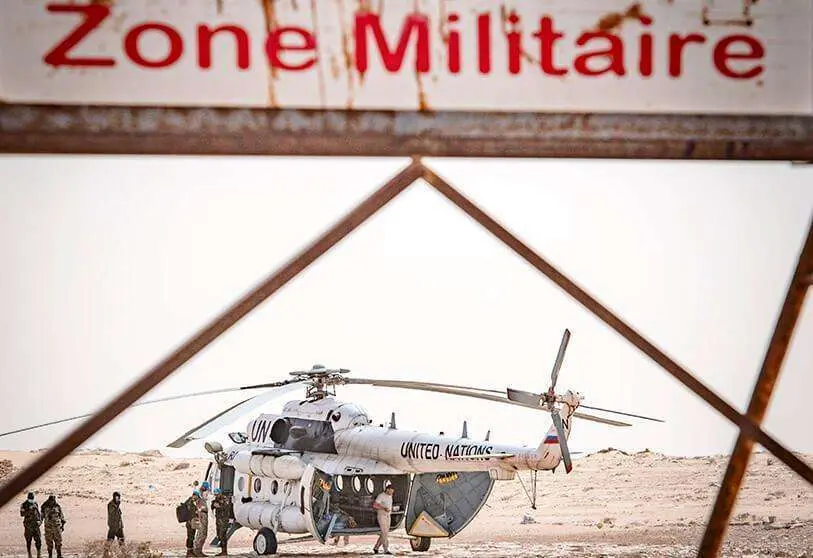La ONU baraja nombrar un español como Enviado Especial para el Sáhara Occidental

Some members of the United Nations Security Council are said to have suggested to the secretary general, Antonio Guterres, that a Spaniard be appointed as special envoy to Western Sahara, whose mission is to mediate between the parties involved in the conflict. In view of the failure of leading international figures such as the former US Secretary of State James Baker, the US diplomat Christopher Ross and the former German president Horst Kohler, the UN secretary general could appoint a Spaniard to the post.
Several member countries of the Security Council and others with influence on the world agora in New York consider that Spain is not actively committed to finding a solution to a conflict in which it was originally involved. Following the Madrid Agreement signed by the Spanish government with the Moroccan and Mauritanian governments on 14 November 1975 and submitted to the United Nations registry, Spain ceded the territory and left the scene. Since then it has not taken part in any negotiations to settle the conflict between Morocco and the Polisario Front over the sovereignty of the former Spanish colony.
The possibility of appointing a Spaniard as Antonio Guterres' Special Envoy for the Sahara would fill this absence and force Spain to regain a leading role in the conflict.
Members of the Security Council consider that if this appointment were to be made, it would have to fall to a former Spanish president, not only because of the symbolism of the function but also because the parties involved in the conflict, the three Maghrebi countries Morocco, Algeria and Mauritania, together with the Polisario Front, would demand a commitment at the highest level from what was the territory's colonising power until 1975.
The three former Spanish presidents following the political transition who are still in office, Felipe González, José María Aznar and José Luis Rodríguez Zapatero, meet conditions for and against the suitability of the post. What they all have in common is an exhaustive knowledge of the conflict and extensive experience in dealing with the thorny and sensitive issues Spain has had to face since Franco's death, and from which it has emerged relatively successful. Political experience, capacity for dialogue and objectivity in dealing with disputes have characterised the three Spanish leaders. Similarly, the three possible candidates have maintained direct relations with the actors in the conflict and have met with all of them separately on several occasions.
The question, then, is whether or not the actors in the territorial conflict accept them. According to some information circulating among the members of the Polisario Front and to which ATALAYAR has had access, Morocco could be inclined to favour José Luis Rodríguez Zapatero, whereas Algeria and the Saharawi front would do so more for José María Aznar.
As for Felipe González, he enjoys Morocco's confidence and in the past has maintained close relations with Algeria (it was under his mandate that Spain and Algeria signed the major bilateral contracts) and with Polisario, that although the then Spanish president decided to close the offices of the Polisario Front in Madrid in 1985 following an attack by armed commandos of the Front on the Spanish patrol boat Tagomago in which an officer of the Navy was killed, he allowed it to be reopened in 1989, with the consequent material and logistical support of hundreds of town councils, regions and autonomous governments governed by the PSOE, to the Saharawi independence movement.
It should also be pointed out in these possible candidacies that former President Zapatero, in addition to considering himself a good friend of Morocco, is also a good friend of Venezuela's Nicolás Maduro and through him maintains a discreet relationship with the Algerian regime and the Polisario movement. Zapatero recently sent a message of greeting and support to the recently established Saharawi Movement for Peace, which advocates a peaceful and negotiated solution to the conflict.
As for José María Aznar, the difficulties in obtaining a placet from Morocco for his hypothetical appointment are due more to the former Spanish leader's personal relations with King Mohammed VI than to his political profile. It should be recalled in this connection that President Aznar defused the time bomb of the Perejil conflict in the summer of 2002, set off by hidden forces interested in fanning the Spanish-Moroccan rift. After the islet conflict, Aznar travelled to Morocco and, in a wide-ranging interview with King Mohammed VI, laid the foundations for multiform co-operation and formalised the creation of bilateral structures for settling the disputes between the two countries. Although the personal trend is not the best, the negotiating skills of the former Spanish president are taken into account at the royal palace in Rabat.
The very fact that the United Nations Secretariat is considering appointing a Spaniard as Special Envoy is an important change in the world organisation's management of the conflict and, according to some sources, a real possibility of success.









